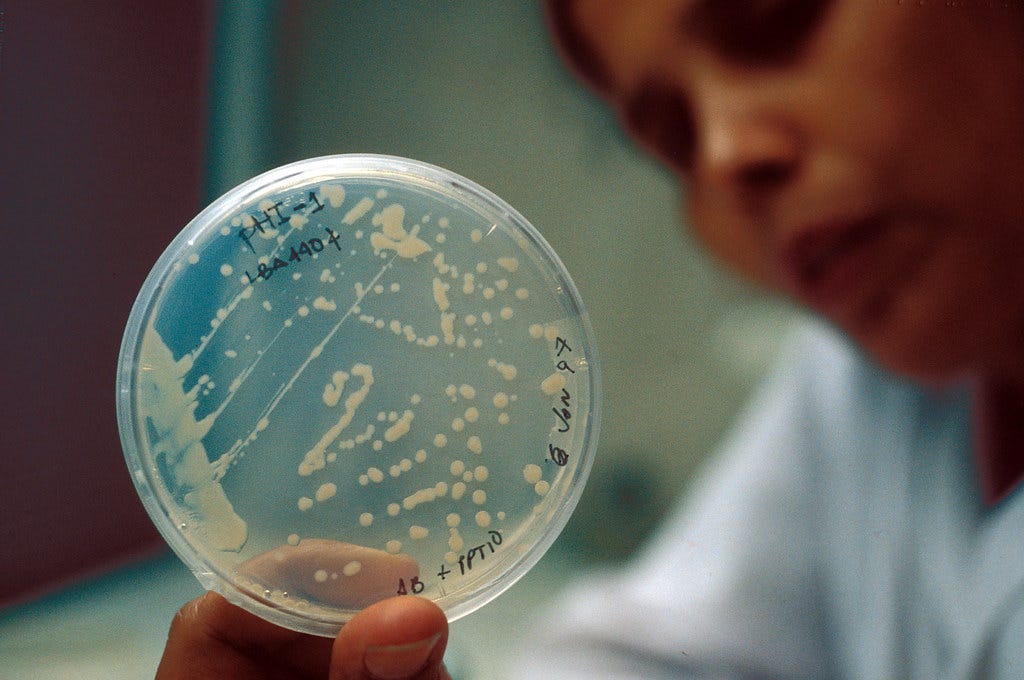Where Do You Make Amends for Unjust Systems?
Modern life entangles us in material cooperation with evil
I’d still appreciate your responses to my survey on miscarriage and paid leave from work. I’m working on a piece for the Institute for Family Studies, but I’ll also share some highlights from your discussion this Thursday.

This weekend, I had a piece in the NYT trying to address the concerns of some vaccine-hesitant Catholics. I’ve gotten both my shots, and I hope everyone else will, too, but I think a number of hesitant people are raising questions in earnest, which deserve serious answers.
In this case, the issue is that the vaccines were developed or tested using cells sourced from children lost through abortions. And, to clarify two things up front: these are cell lines from abortions many years ago—the vaccines don’t depend on the continuation of abortion. And there is no tissue from these children in the vaccines themselves. But, understandably, that doesn’t resolve everyone’s concerns:
Although the Vatican has stated clearly that the vaccines approved in the United States are “morally licit” to receive, some Catholics are reluctant because these vaccines have been developed or tested using lab-replicated cells cultured from aborted fetuses. […]
When we reap the benefit of what we see as a past injustice, we are implicated in the original wrongdoing. We have to decide if our actions compound the original abuse and what kinds of reparations we must make.
The Jesuits of Georgetown University have been wrestling with a similar question of moral contamination. The order funded the school partly through the exploitation and sale of slaves. To make amends, the university has begun a fund-raising campaign to pay reparations to the descendants of those slaves. But a Georgetown professor still has to ask the same question as a someone rolling up his sleeve for the vaccine: Can I accept a benefit premised on someone else’s suffering?
Our lives are enmeshed in material cooperation with evil. It’s sometimes permissible, when we don’t will the evil, try to avoid deeper entanglement, and lack alternatives, but @pgepps has it pretty much right here.
I focused on vaccines and racial injustice in the United States, but one example of material cooperation with evil that I didn’t manage to incorporate in the piece is buying cotton sourced from Xinjiang, where China is carrying out a genocidal campaign against the Uighurs.




After learning about how chicken farmers are treated and forced to compete against one another to increase their earnings, I decided to take the plunge and only buy locally raised meat through a delivery service. We now eat vegetarian 3-4 nights a week as a result. I never considered myself a big animal rights person, but the more I learned, the more outraged (and tbh totally grossed out) I became.
I think most attempts to avoid personal material cooperation with evil, in a society fraught with inequality, injustice and the degradation of our world and our relationships, lead us to actually avoid taking the steps necessary to make amends or reparations. The goal should be to stop the evil in the first place, and to do so collectively with a shared and clearly defined outcome and benchmarks to measure progress.
It's hard work, for instance, to volunteer for a local organization committed to an outcome of drastically decreasing CO2 emissions. First, your goal may be eliminating a local coal plant that causes asthma, which you work on for years. Then you might set your organization's sights on stopping an oil pipeline, which you work on for years. Then you work together to help pass legislation to subsidize electric vehicles (all while working on other projects along the way). That's much harder work in many ways than buying an electric vehicle or attempting to monitor and pay back your individual CO2 output. But it's also less maddening, more impactful and more rewarding! Plus, it's done in community - which is its own good.
This isn't to say that we shouldn't choose good where we can. It's easy for me to eat mostly organic or avoid Driscolls berries or stop eating fish (seaspiracy documentary shoutout!). But I try to consciously spend less time & energy interrogating personal choices than working collectively for change.
One last thought: dwelling on personal material cooperation can actually separate us from the world in profound and hurtful ways. When we value purity over pursuit of justice, we can separate ourselves from communities who could be part of the change we want to see, or separate ourselves from collective work that is already happening.